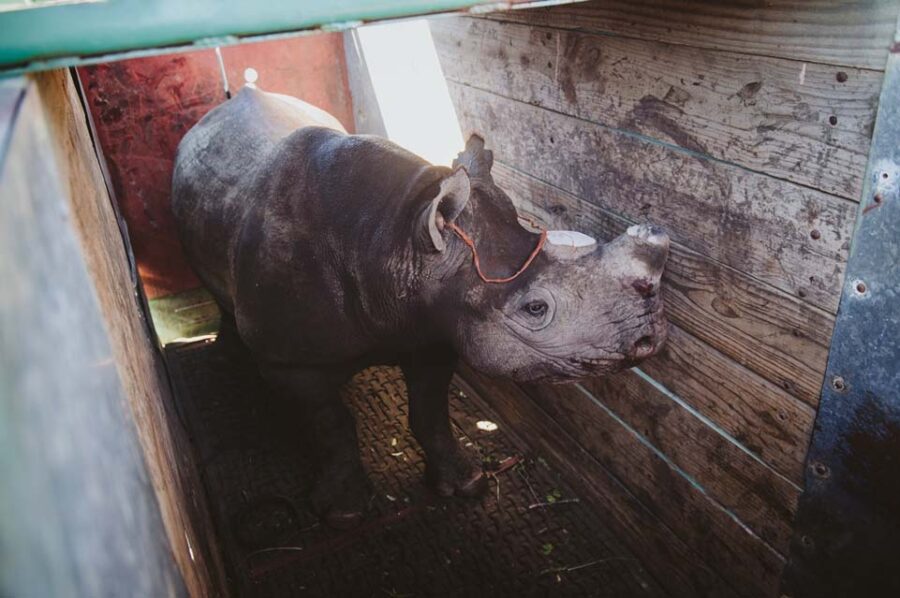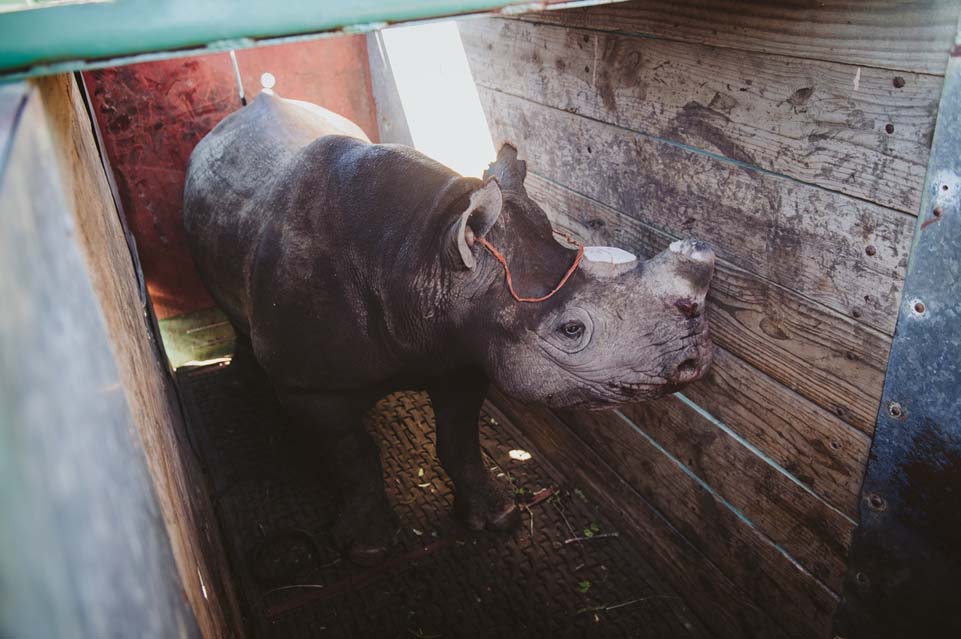
Rhino Relocation Brings Hope Amidst Escalating Poaching in KZN
With rhino poaching in KwaZulu-Natal (KZN) reaching monstrous levels, there comes a glimmer of hope that action is being taken to protect some of South Africa’s precious wildlife. Four Black Rhino have been successful translocated as part of a leading conservation programme to a safer location that will help the expansion of the species. Between […]

With rhino poaching in KwaZulu-Natal (KZN) reaching monstrous levels, there comes a glimmer of hope that action is being taken to protect some of South Africa’s precious wildlife. Four Black Rhino have been successful translocated as part of a leading conservation programme to a safer location that will help the expansion of the species.

Between 1 January and 25 March this year, a devastating 61 rhinos were poached solely from the Ezemvelo KZN Wildlife parks. That’s officially. Unofficially the number stands closer to 80, according to SA’s opposition party, the DA. It’s been a two-year onslaught.
The DA says: «The statistics make for a horrifying scenario of ongoing bloodshed in our province and all indications are that this years’ figures will far outstrip the 97 rhino poached in 2021.»
The recent rhino translocation brings some hope though…
Four Black Rhino translocated from Ezemvelo
In mid-April, four Black Rhinoceros bulls were translocated from Ezemvelo KZN Wildlife’s Weenen Nature Reserve and Ithala Game Reserve to Bonamanzi Game Reserve in northern Kwa-Zulu Natal.
The successful move, made possible by funding from the Black Rhino Range Expansion Project, was carried out by Ezemvelo KZN Wildlife, Heligistix, and Wildlife ACT. The aim of the project is for Ezemvelo to partner with private and communal land owners to increase the habitat available to Black Rhino.

Under the terms of the agreement, Ezemvelo KZN Wildlife provides the Rhino, while the receiving property is responsible for the care and custodianship of the animals.
The selection process
Four Black Rhino were specifically selected for the relocation in accordance with thorough assessment criteria. Having reached maturity, these animals were relocated in order to preserve the genetics of the Weenen and Ithala Black Rhino population, as well as to prevent conflict between the bulls.
“Weenen has a very specific Black Rhino breeding program,” says the Reserve’s Conservation Manager, Frik Lemmer. “These young bulls need to be relocated to other reserves in order to protect the genetic wellbeing of the population.

“We have a resident breeding bull on Weenen, and that animal should not be challenged in any way by other bulls on a property this size,” explains Lemmer. “It could lead to fighting, breakouts, and even the possible death of one of the animals.”
The relocation to Bonamanzi Game Reserve will not only protect existing
populations, but also further promote the expansion of Black Rhino breeding opportunities in Kwa-Zulu Natal.
Land expansion efforts
The aim of the Black Rhino Range Expansion Project is to increase the species’ range and ultimately promote the growth of the population.
“Black Rhinos are very much at risk, which is why the breeding of these animals at smaller reserves like Weenen Nature Reserve is an important part of the population dynamic and the overall conservation of the species,” says Lemmer.
WWF’s Black Rhino Expansion Project has successfully created 13 new Black Rhino populations in South Africa since beginning in 2003.
A new beginning
Led by Ezemvelo KZN Wildlife’s Game Capture Unit, including their veterinary team, the Black Rhino were darted, dehorned, and loaded into large crates. The Game Capture Unit transported them via trucks safely to their new home at Bonamanzi Game Reserve.
The move marks an exciting first for Bonamanzi Game Reserve, with these bulls being their first ever Black Rhinos.
Prior to releasing the Rhino into their new home, Wildlife ACT – specialising in threatened species monitoring and conservation – fitted each individual with tracking devices to ensure constant monitoring upon their release.
The move was carried out as part of the Black Rhino Range Expansion Project, a partnership between Ezemvelo KZN Wildlife and WWF, together with Wildlife ACT and Bonamanzi Game Reserve.
Other proposals from Ezemvelo
Embattled Ezemvelo is finally considering other proposals too to curb rhino poaching. The proposals include adopting crime fighting and anti-rhino poaching techniques, and forming a multi-disciplinary anti-poaching task team.
To address the rhino poaching crisis, Ezemvelo management has now proposed:
• Increased field ranger capacity
• The involvement of crime intelligence and “other law enforcement entities” and;
• Reviving provincial priority crime structures to improve intelligence.
The DA calls this response « a slap in the face to the public and conservationists who have, for years, lamented the poor cooperation between various law enforcement entities and Ezemvelo.
« Meanwhile, dedicated crime intelligence operatives – who apprehended and shot armed poachers – have been systematically worked out of the SAPS while an electronic anti-poaching nerve centre in the Hluhluwe-Mfolozi Park is largely dysfunctional. »
KZN’s Economic Development, Tourism and Environmental Affairs’ (EDTEA) has admitted their failure to fill critical vacances has contributed to the poaching crisis, said the DA.
« EDTEA MEC Ravi Pillay and his political cohort now need to make speedy budgetary interventions to not only fill vacancies but also properly equip more rangers and capacitate existing staff. The current proposed budget simply does not do enough to save this species. »
